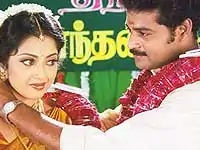Kannamma (film)
Kannamma (Tamil: கண்ணம்மா) is a 2005 Tamil language film directed by S. S. Baba Vikram, starring Meena as the titular character along with Prem Kumar and Bose Venkat in lead roles. The film was dubbed in Telugu as Lakshmi Sowbhagyavathi.[1] The script was written by M. Karunanidhi.[2][3]
| Kannamma | |
|---|---|
 | |
| Directed by | S. S. Baba Vikram |
| Produced by | S. S. Baba Vikram |
| Screenplay by | M. Karunanidhi |
| Story by | S. S. Baba Vikram |
| Starring | Meena Prem Kumar Bose Venkat |
| Music by | S. A. Rajkumar |
| Cinematography | C. M. Muthu |
| Edited by | Vikram Raja |
Production company | Baba Cine Films |
| Distributed by | Baba Cine Films |
Release date |
|
| Country | India |
| Language | Tamil |
Plot
The story is that of a rich medical student named Kannamma (Meena), who falls in love with Anandan (Prem Kumar) after he saves her from an acid attack by her driver Babu (Karate Raja). Anand's friend Madan (Bose Venkat) becomes Kannamma's ever-vigilant sentinel, risking his own marriage with Mala (Vindhya). Kannamma comes to know of Anand's martyrdom through TV. Her baby is disputed, and she is brought before a village council.
Cast
| Actor | Role |
|---|---|
| Meena | Kannamma |
| Prem Kumar | Anandan |
| Bose Venkat | Madan |
| Vindhya | Mala |
| Karate Raja | Babu |
| Vadivukkarasi | |
| Vaiyapuri | |
| Kuyili | |
| Chandrasekhar |
Soundtrack
| Kannamma | ||||
|---|---|---|---|---|
| Soundtrack album by | ||||
| Released | 2005 | |||
| Recorded | 2005 | |||
| Genre | Soundtrack | |||
| Length | 27:33 | |||
| Label | Star Music | |||
| Producer | S. A. Rajkumar | |||
| S. A. Rajkumar chronology | ||||
| ||||
Music was composed by S. A. Rajkumar and Released on Star Music.[4]
| No. | Title | Lyrics | Singer(s) | Length |
|---|---|---|---|---|
| 1. | "Kaikodu Kaikodu" | Vairamuthu | Mathangi Jagdish, Srinivas | 4:46 |
| 2. | "Ennai Ethanai" | Vaali | Pop Shalini, Tippu | 4:33 |
| 3. | "Ilaignane Ilaignane" | Karunanidhi | Manikka Vinayagam | 3:23 |
| 4. | "Kichu Kichu" | Vaali | Anuradha Sriram | 3:59 |
| 5. | "Aalamara Kilaiyinilae" | Baba Vikram | Swarnalatha | 5:03 |
| 6. | "Iru Vizhi Mazhai" | Karunanidhi | Vani Jairam | 5:49 |
| Total length: | 27:33 | |||
Reception
Rediff wrote that "It is quite obvious that the director has not updated himself on how films are made today, in 2005. This film may have worked if it were made in the early 1960s".[5] Balaji B of Thiraipadam wrote "It is neither a political satire nor, in spite of having the heroine's name as its title, a socially relevant film. His [Karunaidhi] dialogues do shine at some places but for the most part, are made irrelevannt by the horrid screenplay and bad character development."[6] Indiaglitz wrote "The film is peppered with messages on nationalism, caste and communal harmony. But it lacks the spellbinding effect of certain war films."[7]
References
- https://www.youtube.com/watch?v=JzX3Zyk1jJw
- "Karunanidhi scripts another run". www.tribuneindia.com.
- "When Kalaignar visited Doddabetta peak and tasted Badaga food in 2004". Deccan Chronicle. 8 August 2019.
- "Kanaamma - All Songs - Download or Listen Free - Saavn". 1 January 2005. Retrieved 16 November 2018.
- "Kalaignarin Kannamma disappoints". www.rediff.com.
- http://www.thiraipadam.com/cgi-bin/movie_review.pl?id=458&user_name=bbalaji&review_lang=english&lang=english
- "Kannamma review. Kannamma Tamil movie review, story, rating". IndiaGlitz.com.